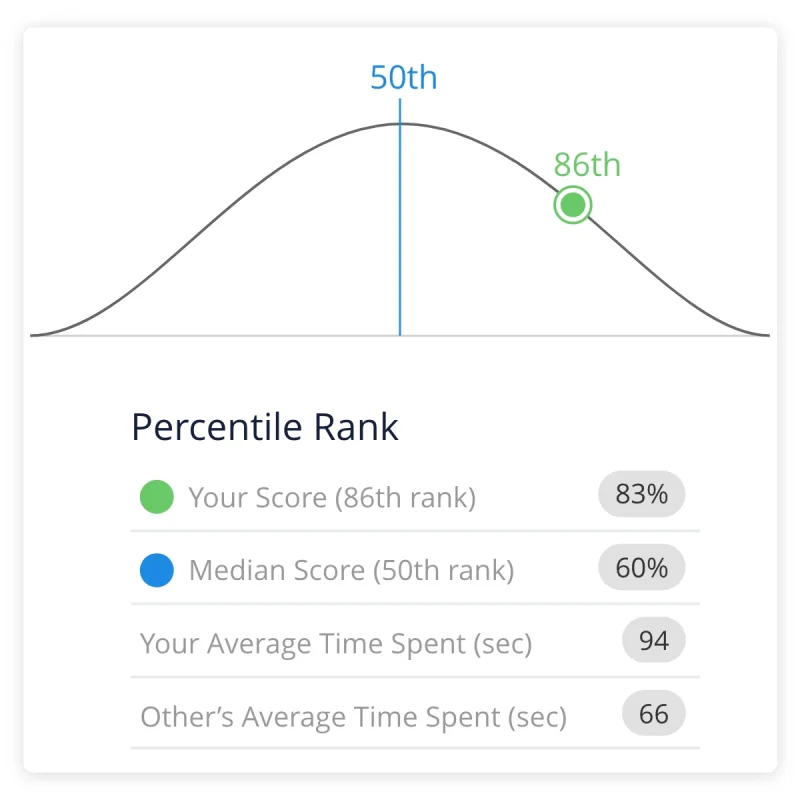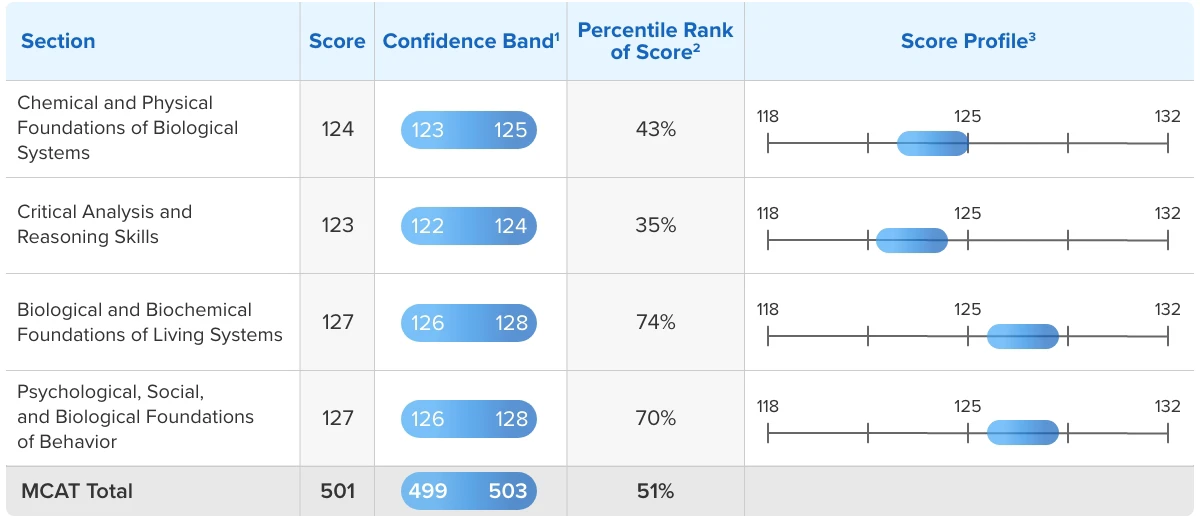How Is the MCAT Scored?
The MCAT is scored using the AAMC’s scaled score system. Instead of relying solely on raw scores, this system converts your number of correct answers into a scaled score. This process accounts for slight differences in difficulty between test versions, ensuring a fair and consistent measure of performance across all examinees.
MCAT Raw Score
Your raw MCAT score is simply the number of questions you answer correctly in each section. Every correct answer counts equally, there’s no penalty for guessing. That means if you’re unsure about a question, it’s always best to take your best guess. And if you’re short on time, make sure to answer all remaining questions.
Once your raw score is calculated, it is converted to a scaled score through a process called equating. This ensures that scores from different exam versions are comparable, even if some are slightly more difficult than others.
MCAT Score Ranges
Your total MCAT score—the sum of your four section scores—ranges from 472 to 528. MCAT scores range from 118 to 132 for each exam section. Because all questions are weighted equally, and there’s no penalty for incorrect answers, strategic guessing can work in your favor.
What is the Best MCAT Score?
The best MCAT score you can achieve is 528, which is the highest MCAT score possible according to the AAMC MCAT score range. This score represents a perfect 132 in each of the four exam sections.
While a 528 is the best MCAT score you can get, it's important to understand that "best" is relative. For example:
- A 520 MCAT score puts you in the 97th percentile of all test takers—outstanding for top-tier medical schools.
- A 515–519 score range is still exceptional and competitive for medical school applicants
| MCAT Score | Relative Ranking | Score Outlook |
|---|---|---|
| 528 | Highest MCAT score | Rare, elite tier |
| 520–527 | Top 1-3% | Top medical schools |
| 515–519 | Top 10% | Very competitive |
| 510–514 | Strong | Above average |
So, what is the best MCAT score for you? It's the score that gives you the best chance of admission at the medical schools you're most excited about. Check the matriculant's MCAT scores to define what your personal score target should be.
To maximize your MCAT score, ensure you use a high-quality MCAT prep course that offers comprehensive content review, realistic practice, and analytics to track your progress—tools proven to boost both confidence and performance.
What is an Average MCAT Score?
The average score among MCAT test-takers is between 506 and 507. However, students who successfully matriculate into medical school tend to score higher, with an average MCAT score between 511 and 512.
MCAT Percentile Ranks by Score
The table below shows how scaled MCAT scores correspond to percentile ranks, helping you understand how your performance compares to other test takers.
| Total Score | Percentile Rank | Total Score | Percentile Rank | Total Score | Percentile Rank |
|---|---|---|---|---|---|
| 472 | <1 | 491 | 22 | 510 | 79 |
| 473 | <1 | 492 | 25 | 511 | 82 |
| 474 | <1 | 493 | 27 | 512 | 84 |
| 475 | 1 | 494 | 30 | 513 | 87 |
| 476 | 1 | 495 | 33 | 514 | 89 |
| 477 | 2 | 496 | 36 | 515 | 91 |
| 478 | 2 | 497 | 39 | 516 | 92 |
| 479 | 3 | 498 | 42 | 517 | 94 |
| 480 | 4 | 499 | 45 | 518 | 95 |
| 481 | 5 | 500 | 48 | 519 | 96 |
| 482 | 6 | 501 | 51 | 520 | 97 |
| 483 | 7 | 502 | 54 | 521 | 98 |
| 484 | 9 | 503 | 58 | 522 | 99 |
| 485 | 10 | 504 | 61 | 523 | 99 |
| 486 | 12 | 505 | 64 | 524 | 100 |
| 487 | 14 | 506 | 67 | 525 | 100 |
| 488 | 16 | 507 | 70 | 526 | 100 |
| 489 | 18 | 508 | 73 | 527 | 100 |
| 490 | 20 | 509 | 76 | 528 | 100 |
Summary:
- A score of 500 places you in the 48th percentile, meaning you performed better than about half of test takers.
- A 511 puts you around the 82th percentile, a competitive score for many medical schools.
- Scores below 490 typically fall in the bottom quartile, which may signal the need for additional prep or a retake.
These percentile ranks help admissions committees contextualize your performance. Two students might get the same raw number of questions correct on different exam versions, but percentile ranks show how each performed relative to the larger test-taking population.
How To Track Your Percentile Rank
If you haven’t taken the MCAT yet, UWorld’s MCAT performance tracking feature offers percentile rank indicators that display your level of preparedness compared to other UWorld MCAT users. Tracking your percentile rank helps you identify where you stand in a competitive applicant pool, allowing you to adjust your study strategy and focus on areas that will yield the greatest improvement.
If you have already taken your MCAT, you can review your MCAT score report to see your percentile rank.
Medical School Acceptance Rates by MCAT Score
To help you determine the MCAT score you need to get accepted into medical school, the Association of American Medical Colleges (AAMC) keeps a chart of acceptance rates to U.S. M.D.-granting medical schools by MCAT score and GPA. Below, we’ve parsed out GPA data and provided a quick look at acceptance rates by MCAT score.
| MCAT Score | Acceptance Rate for All Applicants |
|---|---|
| < 486 | 0.7% |
| 486-489 | 1.3% |
| 490-493 | 3.6% |
| 494-497 | 11.6% |
| 498-501 | 20.9% |
| 502-505 | 31.9% |
| 506-509 | 41.7% |
| 510-513 | 57.1% |
| 514-517 | 68.0% |
| > 517 | 78.1% |
Source: AAMC Matriculation Rates
MCAT Score Report
After taking the MCAT, you’ll receive a detailed score report that includes your total and section scores, percentile ranks, confidence bands, and score profiles. While percentile ranks reflect how your score compares to others, confidence bands account for score variability across exam versions—typically ±1 point per section and ±2 points for the total score. Score profiles visually show these bands to help you understand your performance range within each section.
Receiving and Sending Your MCAT Score
When you receive your MCAT score, it is automatically released to the American Medical College Application Service® (AMCAS®). This eliminates a step in your application process, but means you cannot withhold your score. You can also send your MCAT score to other centralized application services – including the American Association of Colleges of Osteopathic Medicine Application Service (AACOMAS), Centralized Application Service for Physician Assistants (CASPA), Schools of Public Health Application Service (SOPHAS), etc. – or individual institutions through the AAMC’s Score Reporting System, or by mailing your official score report.
MCAT Rescore Request
The AAMC’s scoring verification measures are rigorous, meaning errors in the scoring process are very rare; however, you may submit a rescore request within 30 calendar days of your score release date for a fee of $80. Your answers will then be independently rescored by hand to verify accuracy. You will receive a confirmation of your scaled score within three weeks.
Frequently Asked Questions (FAQs)
Is 528 the Best MCAT Score?
Yes, the highest score a student can achieve on the MCAT is a 528. Achieving the best MCAT score requires a strong mix of foundational knowledge, strategic prep, and rigorous practice. It is rare to achieve a perfect score but it is possible with the right approach.
Is the MCAT curved?
The MCAT is not scored on a curve, but it is graded using scaled scoring. Scaled scoring is a process by which your raw score (total correct answers) is weighted based on your specific exam form’s difficulty. This results in more accurate examinee performance comparisons.
What is the highest MCAT score?
The highest possible MCAT score is 528. To achieve a perfect score, you need to score 132 on each of the exam’s four sections.
What is the average MCAT score?
The average MCAT score is 506.3 for applicants and 511.7 for matriculants (based on 2023 to 2024 data). Average scores for applicants by section are CPBS: 126.4, CARS: 125.8, BBLS: 126.6, and PSBB: 127.4. Average scores for matriculants by section are CPBS: 127.8, CARS: 127.0, BBLS: 128.1, and PSBB: 128.9.
When are MCAT scores released?
MCAT scores are released approximately 30 to 35 days after your test date and will be available by 5 p.m. ET on your exam date’s listed score release date.
How long do MCAT scores last?
MCAT scores are typically valid for 2-3 years, depending on which medical schools you intend to apply to. It’s recommended to check with your preferred schools’ admissions requirements in advance.
Read More Related Articles
MCAT Test Dates & Score Release Dates
View the latest MCAT testing calendar for your country, including registration deadlines and score release dates based on when you take the exam.
Learn about the MCAT registration and scheduling process, including suggested prerequisites, rescheduling information, and various costs and fees.
Learn everything you need to know about the MCAT exam. We’ll walk you through what it is, when to take it, what it covers, its format, and how you should prepare.
Develop an in-depth understanding of all 7 topics covered on the MCAT, such as sociology and psychology, chemistry, physics, bio, and CARS.

![MCAT score range by section and total score]](https://gradschool.uworld.com/wp-content/uploads/2024/11/01Grad_MCAT-Scores-Precentiles_Graphic.webp)






